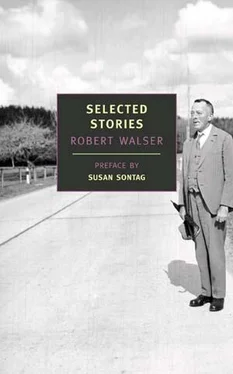“Impudence!” the young lady cried. “It would give me the greatest of pleasure to dismiss you, only to grieve you; still, I’ll be merciful. But if you are ever ungallant again, you will have breathed in my presence for the last time, long for me as you may. Now, proceed.”
He began again, and said: “I never gave much to women, and so they value me. Also in you, miss, I detect an admiration for the simplest loon ever to utter indiscretions to ladies merely to make them angry and afterwards content again. I arrived as ambassador in Constantinople—”
“No lies, Mr. Braggart!”
“—and one day at the railway terminus caught sight of a lady-in-waiting, that is to say, another person saw her, I was sitting next to him in the carriage, he reported to me the observation which I now dish up to you, though only figuratively, for there’s no dish, howbeit I long for a loaded one, because I have developed an appetite in presenting to you a specimen of my powers of rhetoric.”
“Go into the kitchen and serve supper. Meanwhile, I shall read your verses.”
He did as he was told, went into the kitchen, but could not find it. Did he go into it without even having set eyes on it? There must have been a slight slip of the pen.
He went back to Preziosa, who had fallen asleep over his poems, who lay there like a picture in an Oriental fairy tale. One of her hands hung down like a cluster of grapes. He wanted to tell her how he had gone into the kitchen without having found where it was, how gradually, gradually he had grown silent, but an irrefragable impulse had driven him back to the lady he had abandoned. He stood before the sleeper, knelt at the shrine of loveliness, and touched the hand that seemed to him like a Jesukin, too beautiful to hold, with his breath alone.
While he was making his reverences — which one would hardly have expected of him — her eyes opened. She had a lot of questions to ask him, but she only said: “You do not seem to me to be a proper monkey at all. Tell me, are you a royalist?”
“Why should I be that?”
“Because you are so patient, and you spoke of ladies-in-waiting.”
“I only want to be polite.”
“It appears that is just what you are.”
The next day she wanted him to tell her how to find happiness. He gave her the most astonishing answer. “Come, I’ll dictate you a letter,” she said. While he was writing, she glanced over his shoulder to see if he was taking it all faithfully down. Phew! How nimbly he wrote, listening with the most pointed attention to every syllable she spoke. We leave them to their correspondence.
In the birdcage pranced a cockatoo.
Preziosa was thinking of something.
[1925]
THE contents of Dostoevsky’s Idiot pursue me. Lapdogs interest me greatly. I’m not searching for someone as lively as an Aglaya. Unfortunately, she would, of course, take someone else. Marie remains unforgettable to me. One morning did I not stop and stand affectionately before a jackass? Who will introduce me to a General Epanchin’s wife? Valets have wondered about me already, too. It is still questionable whether or not I write as nicely as the offspring of the house of Myshkin and whether or not I have inherited millions. It would be splendid to be taken into the confidence of a beautiful woman. Why haven’t I yet seen a merchant’s house like that of Rogozhin? Why don’t I suffer from convulsive seizures? The idiot was thin, made only a poor impression. A good lad, at whose feet the demimondaine knelt one evening. I definitely expect something similar. I know two or three Kolyas. Wouldn’t an Ivolgin also have to be seen? I’d be capable of knocking down a vase: to doubt this would be to underrate oneself. To make a speech is as difficult as it is easy; it depends on inspiration. I’ve often encountered people who are never satisfied with themselves. Often enough a person is not well because he tries too hard to be pleased with himself. Thereafter I’d arrive in the Schneider Institute. For the time being, Nastasia would have to be pacified. I’m by no means idiotic, but am receptive to every reasonable thing; I’m sorry I’m not the hero of a novel. I’m not up to playing such a part, I just read a lot sometimes.
[1925]
Translated by Tom Whelan and Carol Gehrig
PEOPLE draw my attention to novels by important authors.
I receive letters from publishers.
Society women are mindful of me.
I have genteel manners; of course I suddenly discard them, and then later recover them.
Sometimes I do think I’m odd.
Doctors ask me, in all sympathy, if it’s really true that nobody cares for me, as if they thought it very incorrect.
Soon even I’ll be believing I’ve been neglected. Yet there’s no harm in that, none at all. On the contrary, because of it, I have “lived” that much more intensely.
Every noon, at lunch, I read “my” newspaper. This fact asks to be mentioned. Is there anything else out there asking for a friendly announcement from me?
Could I have “forgotten all sorts of things”?
Once more I’ve changed my domicile. When shall I get around to reading a French book again? I’m longing to do so.
What does “being cultivated” mean? What are all these questions I’m asking myself?
I like looking for a room and that sort of thing. You can look into houses which you would otherwise not look into.
Thus, for instance, while searching for a suitable working space and living room, I arrived inside a house from the baroque period. Old pictures were hanging in the corridors.
Needless to say, I remain interested primarily in attics. I’m interested in so many things.
Shall I soon apply politely for a job? This question, too, weighs enormously on my mind.
In the house of some quite poor people I found a very nice room, but it could not, unfortunately, be heated. At once I declared myself agreeable to the view across the countryside afforded by the tiny window. The room could only be regarded as a sort of cubbyhole.
While looking at this room I was also looking at the landlady. I wanted to find out if she might conceivably become more “intimately” interesting to me.
Moreover, in the little window, standing at some distance on a hill, you could see a People’s Nutrition Building, in which questions of economics and management could be studied. In this elegant house a professor of literature and art once used to live. Somebody had told me this, and now I thought of it. A woman of my acquaintance works there, as a janitress; I met her when she was the keeper of a boardinghouse.
“The table is a bit too small for me, you see I write rather a lot,” I said to the landlady, whose appearance I had scrutinized. I said goodbye to her and went away.
Later I looked at a dark but warm room on a courtyard. To the woman who showed it to me, I said: “Perhaps I’ll come back. At the moment I’m pierced through with arrows.”
“For heaven’s sake,” she asked, dismayed, “what kind of arrows?”
“Cupid’s arrows,” I replied calmly, and most casually, as if these arrows were really no business of mine.
“Yes, some women give no mercy,” she added. I answered: “It’s understandable, every woman’s first concern is herself.”
Whereupon I left, and now this very peculiar question, in my opinion an important one, occupies my thoughts: “Of what does being cultivated consist?” And then this second question, a most important one, it too gives me no peace, the question, I mean, as to what the People means. How on earth shall I cope with these problems?
And this doctor who, in an offhand sort of way, as it were, briefly “mothered” me. He gave me a book to read, which now graces my desk with its presence.
Читать дальше












